REMEMBERING MISS D. GOVINDAMMAL
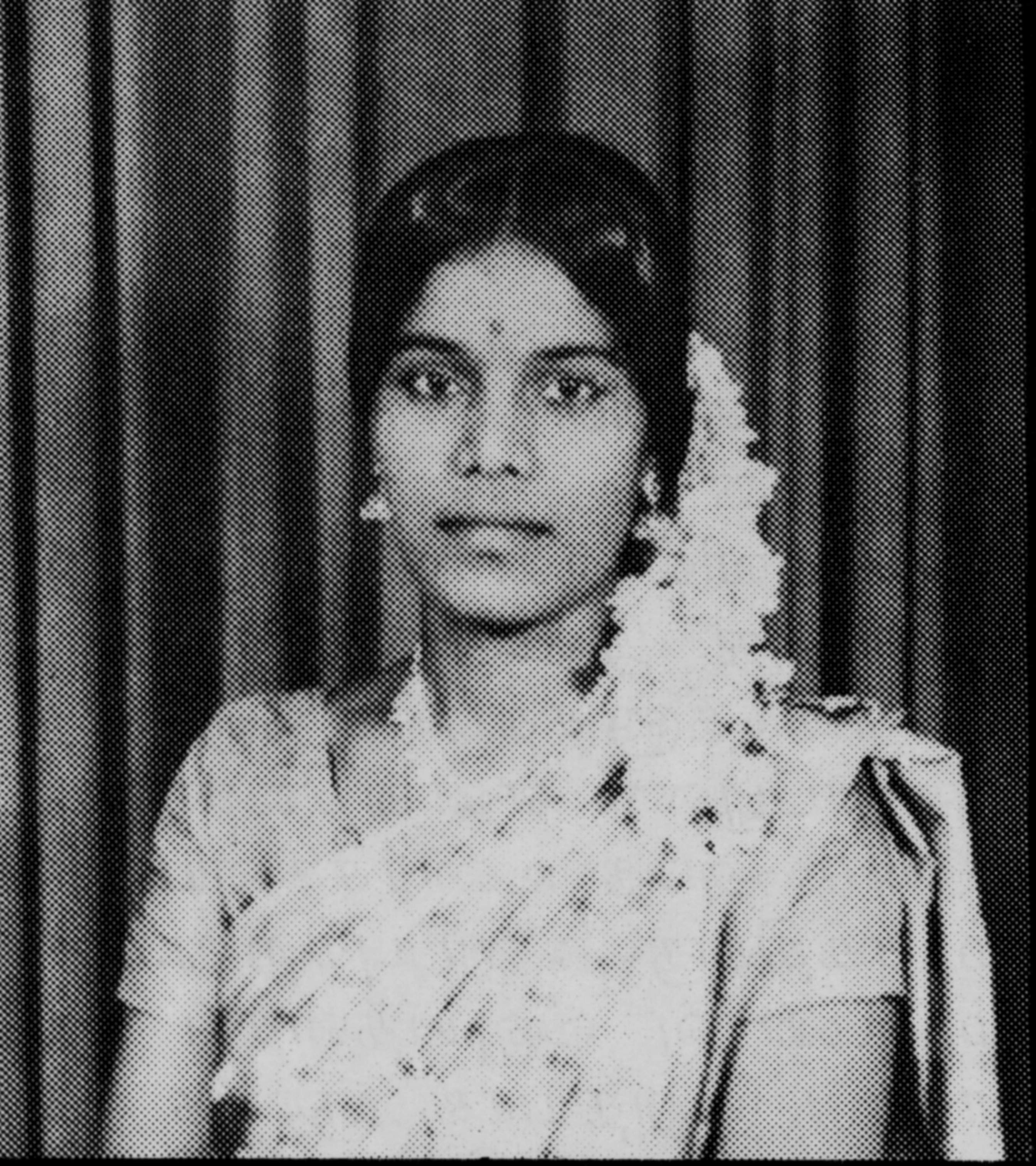
3 March 1951 – 13 June 1979
Here is a moving story of Miss. Govindammal, an unsung heroine. The story revolves around the extraordinarily dramatic circumstances in which she passed away in the pioneering field. She today occupies a special place in the annals of the Faith in Malaysia, having won the eternal glory of being the first Malaysian to have passed away overseas while still at the pioneering post. Hers is a living testimony, that lack of higher education would in no way hinder a true servant from serving the Cause with distinction.
Govindammal comes from a very simple family in an urban village called Jabi near a small town of Pokok Sena in the Northern State of Kedah in Malaysia. Her father is Mr. Doraysamy. It was Mr. Kesavanathan of Alor Setar, and M. Subramaniam or popularly remembered as M. S. Maniam who first gave the Faith to Mr. Doraysamy in 1967. Doraysamy liked the teachings and was ready to become a believer. Doraysamy then called for a family gathering and mentioned about the Bahá’í Faith to them. They too liked the Faith and they all embraced the Faith with gladness. However, accepting a new Faith and living among people of their own kind in a face to face environment was never easy in Malaysia. One had to face relatives and friends who were deeply steeped in strong Hindu beliefs and traditions. It was no surprise that Doraysamy’s family faced bitter opposition and criticism from the people around. Yet, with constant deepening coming from the Bahá’ís of Alor Setar, this family gained a deeper understanding of the tenets of the Faith. The believers of Alor Setar undertook frequent visits to their home in Jabi, which gave them the needed spiritual strength. The family members came for activities held at the Bahá’í Centre in Alor Setar town where they were further strengthened in the Cause. In stages, they grasped the essence of the Bahá’í teachings. This led them to boldly gave up their ancient practices and traditions within a hostile environment. They remained very firm and staunch despite strong opposition that continued to mount from the local population.
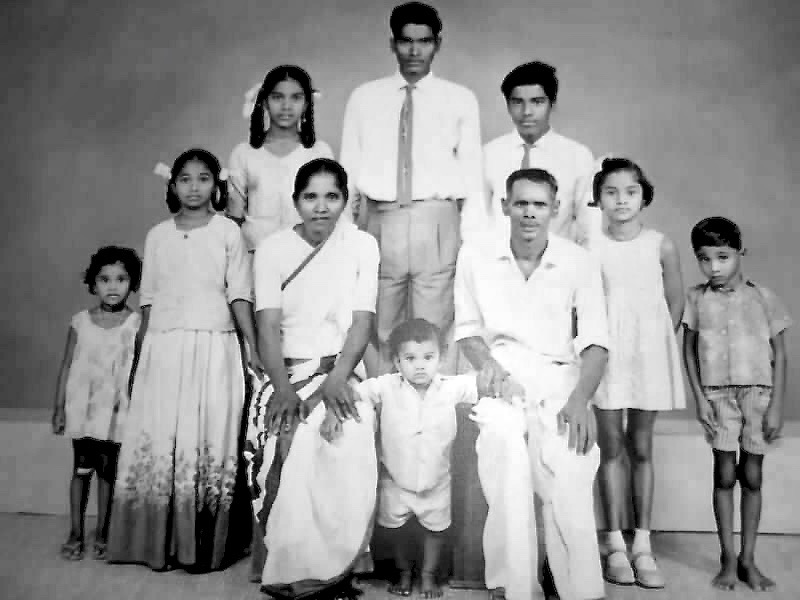
Family photo–Govindammal is standing at the extreme left in the back row.
Govindammal, the fourth child of Doraysamy was special in many ways. Right from the time she accepted the Faith she was on fire with the love of God. She started her responsibility for her family at an early age. Even as a teenager, she went to work as a rubber tapper in the neighboring estate to support her large family.
Although Govindammal was the fourth in the family of eight surviving siblings, she shouldered heavy family responsibilities. Her eldest brother and Govindammal together started to work at an early age to support their family. Govindammal took up the job of tapping rubber trees in a nearby rubber plantation. She herself set a good example by instilling strong family values among her siblings. Though completed elementary six in a Tamil Language School, she developed the art of reading and writing well in the Tamil language, and wrote some Faith-inspired poems which were published in Puthiya Oli (New Light), a national Tamil Bahá’í Magazine in Malaysia, of which Mr. R. Ramarao was the able editor. Govindammal committed herself to conduct children’s classes as a path of her service to the Cause. She was excellent in composing sentimental Bahá’í songs with Bahá’í themes in the Tamil language, based on tunes lifted from popular Tamil film songs. She taught the children to sing those songs. She also instilled Bahá’í virtues and upright character among the children attending her children classes. She had even served as Vice Chairman of the Local Spiritual Assembly of the Bahá’ís of Jabi and as Chairperson of the Local Women’s Committee. She was seen as the backbone of the Jabi Bahá’í Community.
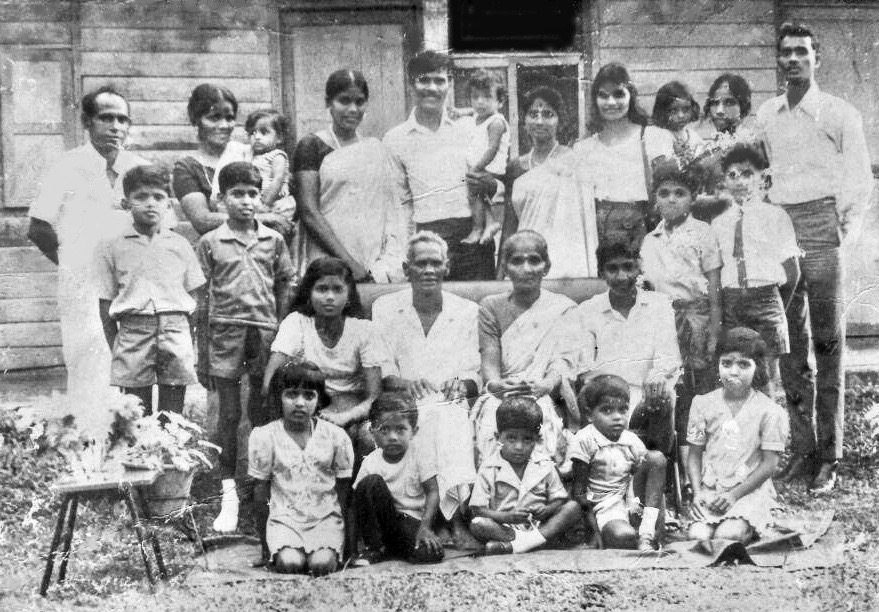
Govindammal, third adult from left with her parents, siblings and relatives in Jabi.
Govindammal was a deeply prayerful person. She used to wake up at dawn and spend much time reciting her prayers in the Tamil language before leaving for work. After work, she would encourage her siblings to join her for teaching in the neighboring estates, a task that she carried out almost daily. During such teaching trips Govindammal taught with so much conviction and enthusiasm. She was so much in love with the Faith that on a number of occasions she used to express her desire to offer her services in Tamil Nadu State in South India. But there was no immediate opportunity.
An opportunity came for her to serve in Tamil Nadu when, at a Bahá’í Conference held in Port Dickson in April 1977, Hand of the Cause of God Dr. Raḥmatu’lláh Muhájir developed the idea of opening up South India to the Faith through the South India Teaching Project. The Malaysian Bahá’í Community was informed that the South India Teaching Project would involve a two-year period commencing 12 November 1977 and ending on 12 November 1979. During this period, 500 villages were to be enrolled into the Faith. The project was launched in Sulur, Tamil Nadu on 20 October 1977, the anniversary of the Birth of the Báb. Govindammal was so excited to be on board this project. She volunteered to go in the first batch, but somehow circumstances did not permit then. She was very sad and started to pray ardently for Bahá’u’lláh to open a path.
Her sincere and ardent prayers were answered when her request to pioneer in South India was approved in 1978. On getting this news, she jumped with joy. She immediately packed her bag with all excitement. As she was bidding farewell to her family she conversed in a tone that indicated she would not return. Her parents, though upset, did not take it seriously. She then came over to Kuala Lumpur to board her flight to Madras (now Chennai) in Tamil Nadu. A day before her flight, she stayed in the National Bahá’í Centre of Malaysia at 32 Jalan Angsana, in Kuala Lumpur. She casually mentioned to Mr. R. Ramarao, the Caretaker and Administrative Assistant residing in the Bahá’í Centre that she wished to lay down her life in Tamil Nadu. Ramarao at first thought it was one of those emotional expressions of an enthusiastic young lady who was full of excitement to serve the Cause. The following day she flew to Tamil Nadu to take part in the South India Teaching Project.
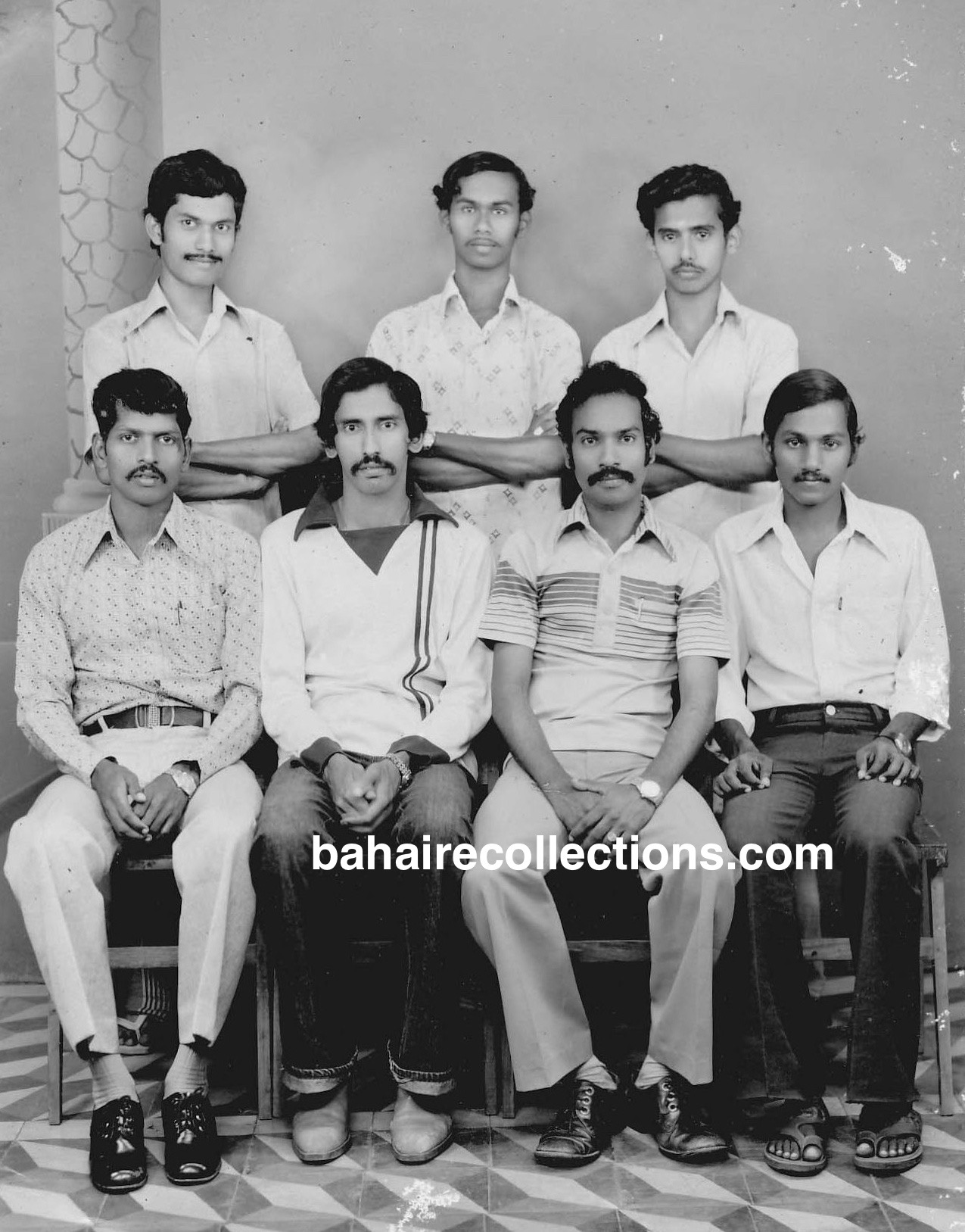
The first batch of participants in the South India Teaching Project are seated. L-R: Indrabalan, Gunasekaran, Muniandy and Selvam Ellumalai.
Standing are local believers from Nagercoil city, Tamil Nadu.
At the time of her arrival in Tamil Nadu, there were two bases — the bigger base in Coimbatore city and a smaller one in Sulur. Govindammal started her services in Coimbatore city. From the first day, she was at the forefront of activities in the teaching field. She was seen to be a lady who showered much kindness and love for other Bahá’í teachers. She showed a lot of care and gave protection for the Bahá’í ladies in the project. She was a motherly figure to all those in her group and proved to be a source of great encouragement to them in moments of depression and despair.
Another Malaysian Bahá’í lady, Malliga Jothy who was teaching the Faith in Ooty (Ootacamund) Hill Station in Tamil Nadu, kept communicating with Govindammal in Coimbatore city. Once Malliga’s duties in Ooty were over, she came over to Coimbatore city and joined the project there. Govindammal and Malliga paired up very well to go for teaching in the villages. Govindammal went into the simple village huts, drank the tea prepared by those humble people, and soon won their love and admiration. In the villages, she started organizing children classes too, an activity that was always close to her heart. The parents of the children in the villages were very pleased with her noble efforts and gave her all the encouragement. The children simply flocked around Govindammal each time she entered the villages.
Govindammal and Malliga made a trip to a tribal village in the hills. Upon return, Malliga contracted chicken pox. The doctor who examined Malliga advised her to move to an isolated place so that a large number of believers in the bigger base in Coimbatore city would not contract chicken pox. Malliga decided to move to the smaller base in Sulur, and Govindammal volunteered to move in with her and look after her. Indrabalan and Selvam, co-workers from Malaysia too joined them in Sulur. After some two weeks, Malliga recovered and she and Govindammal were back in action and started visiting villages for teaching. Each time Govindammal and Malliga set out for teaching, they passed through a nearby Hindu graveyard. Govindammal used to comment in jest to Malliga that she would be buried in that particular graveyard, and that many would visit her grave. Malliga did not take that comment seriously. Malliga just smiled off.
Govindammal originally planned to involve in this Project for six months only. When she saw the need of the Cause was great, she informed Malliga that desired to stay on in Tamil Nadu for a longer period. She also expressed her desire not to get married in order to look after the greater need of the Cause she loved and served with so much devotion and sincerity.
Then came the appointed time. Close to her six months of teaching in Tamil Nadu, Govindammal made a firm decision to stay on. Just three days before Govindammal’s passing, she, assisted by Mr. Indrabalan, wrote to the National Spiritual Assembly of the Bahá’ís of Malaysia in both Malay and Tamil languages, expressing her burning desire to extend further her teaching work in India by another two years. Her wish was gladly granted by the National Spiritual Assembly of Malaysia, and the matter was communicated to her family in Jabi. This was the time when Govindammal was actively serving in the teaching field. One day she suddenly developed a high fever and a severe headache. That morning, as the Bahá’ís were getting ready for their daily teaching, there was a small commotion from the ladies’ room. Selvam Elumalai, another participant from Malaysia went into the lady’s room, and there he saw Govindammal vomiting. Selvam was informed she was having a high fever and severe headache. Indrabalan and Malliga Jothy rushed Govindammal to the Government Hospital in Coimbatore city, while the rest of the believers went on with their teaching routine. At the hospital, she was diagnosed for meningitis, admitted and given treatment. On hearing this, all the local believers and participants of the Teaching Project organized daily group prayers for her. They were confident that she would recover. Malliga remained by Govindammal’s side in the hospital ward, tending to her needs. While resting her head on Malliga’s lap, Govindammal quietly passed away, without Malliga realizing it. The nurse on duty was aware of her passing. She approached Malliga and requested her to leave the room, saying she had to change the bed sheet. After a few minutes of waiting in the corridor of the ward, Malliga saw Indrabalan approaching her with the belongings of Govindammal. He broke the news that Govindammal has been called to the Supreme Heights. Malliga who was weak without sleep the whole night almost collapsed on hearing this unexpected and devastating news. Govindammal passed away on Wednesday, 13 June 1979, at the age of 28.
Her passing brought about a crisis situation. At that time Dr. Sree Ganesh, Project Manager of the South India Teaching Project was at New Delhi for a meeting with the National Spiritual Assembly of the Bahá’ís of India. Miss Ranee Datwani who took charge of the day to day activities in his absence handled the situation well with the cooperation of other believers. This was a case of the passing of a foreigner in Indian soil. The believers had limited financial resources to handle her burial. First things first. Her body had to be transported from the hospital to the teaching base in Sulur. On the day of her passing, there was a general strike throughout Tamil Nadu. All public transportation came to a standstill, including the special vans meant for transporting the dead. The Bahá’ís who gathered in the hospital resorted to prayers, knowing not what to do nor how to handle the situation. And a solution came. The Bahá’ís decided to transport her body in a public taxi. Indrabalan took charge of this and he demonstrated such skills that he alone could have done in the circumstances. He spoke to a taxi driver in a nearby taxi stand, saying there was an urgent need to transport a patient who was in deep sedation. Being a day of the strike the taxi driver charged a high fare. Ranee approved the amount charged as there was no other choice. When the taxi arrived at the hospital entrance, Indrabalan brought Govindammal in a wheelchair. He had given strict instructions to Malliga not to shed tears. Malliga went into the back seat of the taxi first, and Indrabalan placed Govindammal in a sitting position in the taxi with her head leaning on Malliga’s shoulder. Thus, Govindammal’s body arrived in the Sulur base. At the base, her body was skillfully taken into the building. The taxi driver left, and it is not known if he had guessed what was going on. He had his fare. Next came the more serious situation -informing the Institutions in India and Malaysia. Ranee went to the nearby public telephone booth and phoned Dr. Sree Ganesh in New Delhi. The shaken Dr. Sree Ganesh requested the Malaysian Bahá’ís in Sulur to proceed with the funeral arrangements, with the assurance that he would join them at the earliest. Selvam was asked to send telegrams to the National Spiritual Assembly of the Bahá’ís of Malaysia and the State Teaching Committee of Tamil Nadu. Selvam rushed to the local post office and sent those two telegrams. Then came another issue – getting a burial ground to have a burial according to Bahá’í rites. Prayers were on the lips of believers throughout the two days. With the help of an influential local believer, a suitable burial plot was arranged in the Hindu Cemetery in Sulur. The local believers brought some planks and made a simple coffin for her. Her body was placed into that coffin. Govindammal was dressed in her favorite Indian saree dress. The friends brought some flowers and garlands and placed them around the coffin.
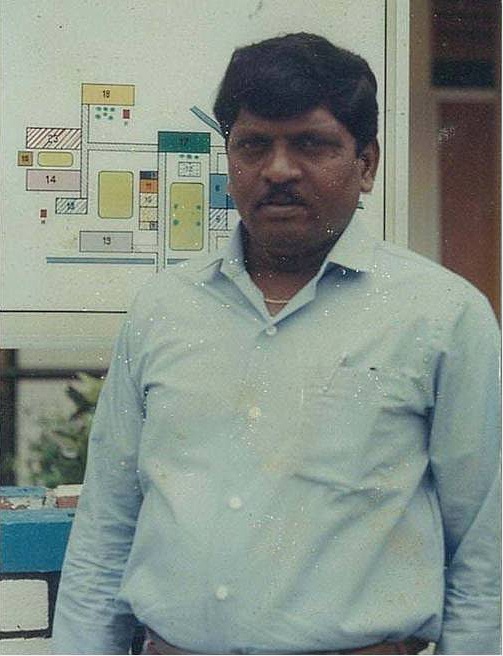
Indrabalan, who passed away in Malaysia in May 1997.
Eyewitnesses who saw Govindammal in the coffin related that she had such a serene and calm face. The few believers who had gathered kept the wake recited prayers throughout the night. By morning several pioneers and travel teachers who heard of her passing arrived in Sulur.
On the noon of the funeral day, Dr. Sree Ganesh arrived with a few members of the National Spiritual Assembly of the Bahá’ís of India, members of State Teaching Committee of India and several local believers. News spread within Sulur too, and those whom Govindammal had befriended or accepted the Faith through her rushed to the base in Sulur to pay their last respects. Some were seen mourning away with inconsolable hearts. Ranee put up a good funeral program. A simple, but a well-decorated carriage was arranged. The coffin was placed onto that carriage and transported to the burial site. Some believers and friends walked behind the carriage to the burial site. Govindammal was buried following a simple, but befitting Bahá’í burial ceremony in a Hindu burial ground near Sulur – the very burial ground where she had wanted to be buried. The burial ceremony itself brought much publicity. Her funeral itself turned out to be a teaching episode. Through her burial, on that spot, it dawns clearly that her wishes to have her bones buried in a foreign country were bountifully graced by the Blessed Beauty. The participants of the South Indian Teaching Project were visibly shaken that one of their greatest workers had been removed from their midst. They took consolation that she was certainly in a far better world, and would assist the teaching project from the Supreme Heights!
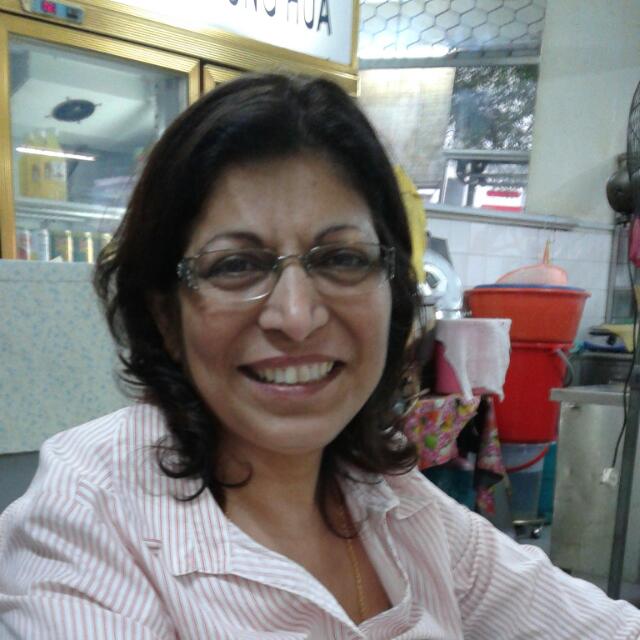
Ranee Datwani Sreedharan, now settled in Malaysia.
Meanwhile, news of her untimely and unexpected passing and burial that had already taken place reached the family, unfortunately only the day after her passing. The news was passed to the family in person by Mr. S. Nagaratnam, Secretary of the National Spiritual Assembly of the Bahá’ís of Malaysia, and R. Ganasa Murthi, an Auxiliary Board member then. On hearing this shocking news all the family members broke down and sobbed. Doraysamy, father of Miss Govindammal remained firm and quiet for some time, with no tears in his eyes. Then he commented with a heavy, but clear heart, “We sent her to serve the Faith, but if Bahá’u’lláh had decided to call her to the Abhá Kingdom, what choice can we have. As a family, we are proud Govindammal has laid her life in the teaching field.” Unfortunately, no one from her family could go to India immediately to pray in the spot in which she was buried. The believers in Kedah kept visiting the family for some days to offer prayers for Govindammal and to give strength to the family in distress.
The Universal House of Justice sent the following message on her passing:
GRIEVE PASSING DEDICATED MAID SERVANT GOVINDAMMAL SUPPLICATING SACRED THRESHOLD PROGRESS HER SOUL EXTEND LOVING SYMPATHY RELATIVES.
The National Spiritual Assembly of the Bahá’ís of India sent the following message:
MUCH GRIEVED PASSING DEVOTED GOVINDAMMAL MAY HER SACRIFICE TEACHING FIELD BE ACCEPTED ABHA KINGDOM PLEASE CONVEY HEARTFELT CONDOLENCES.
Upon completion of the South India Teaching Project, the participants returned to Malaysia. Malliga Jothy who was with her in the hospital at the time of her passing brought back Govindammal’s personal belongings and handed over to the family. She related to them how Govindammal had served the Cause with so much of love for Bahá’u’lláh. There was yet a small consolation for the family. The family members of Govindammal says Malliga resembling Govindammal in many ways. They all took a fond liking for Malliga, as a consolation that God had created somewhat identical twins.
Selvam Ellumalai, a co-teacher from Malaysia in the South India Teaching Project has this to say of Govindammal, “I knew her for the first time during the South India Teaching Project. I found her to be a very simple and detached person, with a deep love for Bahá’u’lláh.”
Malliga her close friend who was with her in her last days says, “It would be difficult to get a dedicated and sincere worker like Govindammal, who radiated so much love for her fellow workers in the Cause of Bahá’u’lláh.”
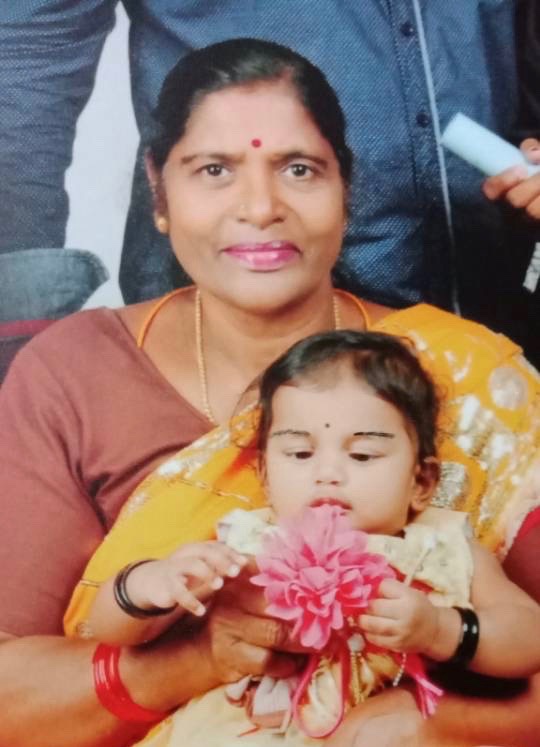
Malliga, a grandmother today in Malaysia.
Dr. Sree Ganesh, Project Manager of the South India Teaching Project says, “Miss Govindammal’s untimely passing has indeed robbed the teaching team of one of the best workers who was so committed, devoted and exemplary in the field. Her passing was an irreparable loss, creating a vacuum that was never filled.”
Ranee Datwani, another co-worker in the Project says, ” Govindammal shall always be remembered for her love, affection, purity of spirit and dedication to the Faith. She had the privilege of burying her bones in the teaching field in a foreign country. She is indeed one of the immortal heroines of the Faith of Bahá’u’lláh.
Ramarao, the editor of a popular Tamil Bahá’í Monthly called “Puthiya Oli” in Malaysia, ran a good coverage of Govindammal in the immediate next issue, and was widely read and well received by the Tamil speaking believers in Malaysia. In that issue, he recalled his conversation with Govindammal a day before her departure to India, in which she had indicated her wish to lay down her life in the blessed teaching field in Tamil Nadu. The news of the passing of Govindammal was the talk of the Malaysian Bahá’í community for many months.
Back in India, the Bahá’ís of Tamil Nadu erected a simple gravestone in her resting place in Sulur, with the hope of refurbishing that for a better one in the future. Several travel teachers and Bahá’í visitors from Malaysia to Tamil Nadu made it a point to pay a visit to her resting place. Sad to relate, with the passage of time, and in the absence of regular and proper caretakers, her grave in Sulur was razed to the ground to give way for development. Today there is no trace of any burial ground there, including her grave. What remains today in the annals of the Faith is the record of Malaysia’s first pioneer who has passed away overseas while still at the pioneering post.
But Mr. Muniappan of Seremban community in Malaysia undertook travel teaching to Tamil Nadu some years after her passing and paid a visit to her resting place in Sulur. He gathered some soil and placed it into a bottle. When he returned to Malaysia, he visited the family of Govindammal and gave the bottle containing that soil. Her family then erected a simple monument in memory of Govindammal in the Bahá’í Cemetery in Alor Setar town.

Burial place of Miss. Govindammal, which no more exists. (L-R) Mrs. Sundari Thangaraj, Mr. Muniappan and Mrs. Adari Gilbert.
In retrospect, it appears that Govindammal had decided to be buried in the teaching field. By Indian custom, one would say “I am going now and shall return” when setting on a long journey. But when bidding farewell to her family in Jabi, Govindammal said, “I am going.” The family was upset with that statement but did not take it seriously. A night before her departure to India, she had informed Ramarao in the National Bahá’í Centre that she had wanted to lay down her life in the teaching field. While in the teaching base in Sulur she had even identified her burial place. Her wishes must have been serious and sincere. Her wishes were bountifully granted.
Not many of us in the current generation may remember the late Miss Govindammal. But her Creator certainly does.
“O Son of Being! Make mention of Me on My earth, that in My heaven I may remember thee, thus shall Mine eyes and thine be solaced.” — Bahá’u’lláh
A. Manisegaran
15 February 2018
Copyright©bahairecollections.com